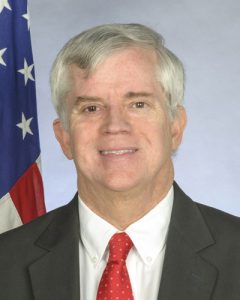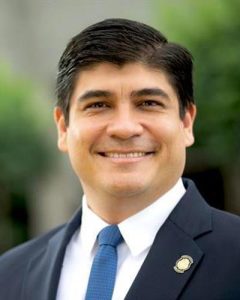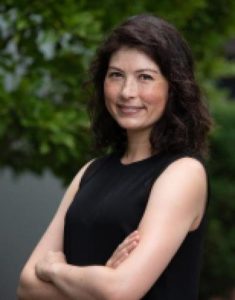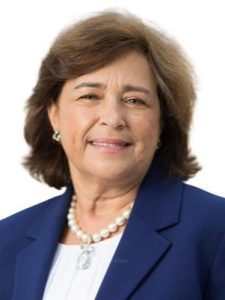Executive Director
A 35-year veteran of the United States Foreign Service, Donald L. Heflin served as U.S. Ambassador to Cabo Verde from 2015- 2018 and as Charge d’Affaires in both Mexico and India.
Heflin joined the State Department in 1987, serving his first assignment as vice consul in Lima, Peru. Further international postings include positions at the U.S. embassies in Lusaka and London and at U.S. consulates in Chennai, Hermosillo, and Nuevo Laredo, where he was Consul General.
In Washington, Heflin served as Rwanda/Burundi desk officer, did two tours in Consular Affairs, and was Deputy Director and Acting Director in the Office of West African Affairs.
Raised in Hunstville, Alabama, Heflin earned a B.A. from Birmingham-Southern College in 1980 and a J.D. from the University of Alabama in 1983. He is fluent in English, Spanish, and Portuguese.
Faculty
Carlos Alvarado Quesada served as the 48th President of the Republic of Costa Rica from May 2018 to May 2022, when his constitutionally limited term ended. Under President Alvarado’s leadership, Costa Rica contributed to global efforts to combat climate change and defended human rights, democracy, and multilateralism.
President Alvarado is a recipient of the 2022 Planetary Leadership Award by the National Geographic Society for his outstanding commitment and action toward protecting the ocean and in September 2019 he received on behalf of his country the Champion on the Earth Award for policy leadership, presented by the United Nations Environment Program. In November 2019, he was named one of TIME’s 100 Next emerging leaders around the world who are shaping the future and defining the next generation of leadership.
President Alvarado’s prior government leadership service includes a tenure as Minister of Labor and Social Security (2016-2018) and as Minister of Human Development and Social Inclusion (2014 – 2016) and Executive President of the Joint Social Welfare Institute, responsible for implementing social protection and promoting poverty alleviation programs. Before entering politics, he worked for Procter and Gamble, Latin America.
Kelly Sims Gallagher is Dean Ad Interim and Professor of Energy and Environmental Policy at The Fletcher School, Tufts University. She directs the Climate Policy Lab and the Center for International Environment and Resource Policy at Fletcher. From June 2014 – September 2015 she served in the Obama Administration as a Senior Policy Advisor in the White House Office of Science and Technology Policy, and as Senior China Advisor in the Special Envoy for Climate Change office at the U.S. State Department. Gallagher is a member of the board of the Belfer Center for Science and International Affairs at Harvard University. She is a non-resident Scholar at the Carnegie Endowment and she also serves on the board of the Energy Foundation China. Broadly, she focuses on energy and climate policy in both the United States and China.
She specializes in how policy spurs the development and deployment of cleaner and more efficient energy technologies, domestically and internationally. A Truman Scholar, she has a MALD and PhD in international affairs from The Fletcher School, and an AB from Occidental College. She speaks Spanish and basic Mandarin Chinese, and is a member of the Council on Foreign Relations. She is the author of “China Shifts Gears: Automakers, Oil, Pollution, and Development,” (The MIT Press 2006), editor of “Acting in Time on Energy Policy,” (Brookings Institution Press 2009), “The Global Diffusion of Clean Energy Technologies: Lessons from China,” (MIT Press 2014), Titans of the Climate (with Xiaowei Xuan) (MIT Press 2018) and numerous academic articles and policy reports.
Michael W. Klein is the William L. Clayton Professor of International Economic Affairs. He served as the Chief Economist in the Office of International Affairs of the United States Department of the Treasury from 2010-2011. He is a Research Associate of the National Bureau of Economic Research, a Non-Resident Senior Fellow of the Brookings Institution, and an Associate editor of the Journal of International Economics. He has been a visiting scholar at the International Monetary Fund, the Board of Governors of the Federal Reserve, the Federal Reserve Bank of Boston, the Federal Reserve Bank of New York, and the Federal Reserve Bank of San Francisco.
His research and teaching focus on international macroeconomics. He has published three books and over two dozen articles on topics such as exchange rate policy, international capital flows, the impact of trade on the U.S. labor market, and the determinants of foreign direct investment. His most recent economics book is Exchange Rate Regimes in the Modern Era, published by MIT Press. His research has been supported by grants from the Up john Institute for Employment Research and the Bill and Melinda Gates Foundation. He received a Ph.D. in economics from Columbia University and a B.A. from Brandeis University.
Dr. Elisabeth Leake is the Lee E. Dirks Professor in Diplomatic History and Associate Professor of History at the Fletcher School, which she joined in 2022. She studied global history at Yale University and the University of Cambridge, where she completed her PhD in 2013. She held a three-year Leverhulme Early Career Fellowship at Royal Holloway, University of London, from 2013–16, before taking up a lectureship at the University of Leeds in 2016.
Dr. Leake’s research to date has been broadly focused on the global histories of decolonization and the Cold War. Her first book, “The Defiant Border: The Afghan-Pakistan Borderlands in the Era of Decolonization, 1936–65,” rethinks the political development of Pakistan’s Federally Administered Tribal Areas. Her second book, “Afghan Crucible: The Soviet Invasion and the Making of Modern Afghanistan,” was published by Oxford University Press in 2022 and won the Society for Historians of American Foreign Relations’ Robert H. Ferrell Prize in 2023. This is a new global history of the Soviet invasion of Afghanistan, 1979–89.
Dr. Leake is currently working on a global history of decolonization and developing a research network examining the comparative and interconnected histories of oppositional politics and modes of dissent in the years immediately following political independence in decolonizing states. She is the chief editor of the Journal of Global History, and she is also one of the organizers of NIHSA (New International Histories of South Asia), a research and public engagement network that explores South Asia’s global engagement in historical context.
Tara D. Sonenshine is the former Under Secretary of State for Public Diplomacy and Public Affairs. An veteran of the news media, she is an Emmy-award winning journalist from her time at ABC NEWS, a former Newsweek editor, and the author of numerous articles on foreign affairs.
From 2009 to 2012, Sonenshine served as the Executive Vice President of the United States Institute of Peace. She taught public diplomacy at The Elliott School of International Affairs at The George Washington University and served as the school’s Senior Career Advisor. She is a regular columnist for TheHill.com. Ms. Sonenshine is a member of the Council on Foreign Relations, and is quoted widely on media, foreign policy, and public diplomacy.






